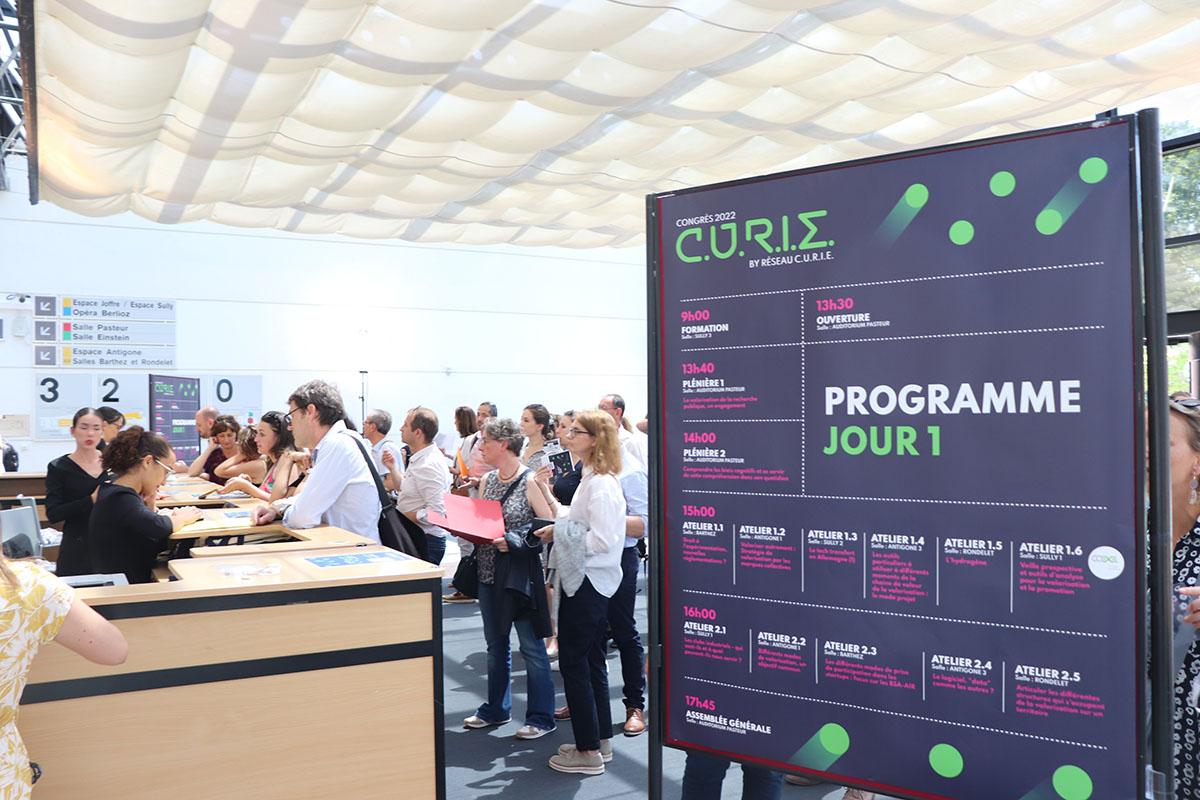UM at the heart of the Curie network
From June 13 to 15, the University of Montpellier hosted the Curie conference, bringing together 600 professionals involved in promoting public research in France. This was an opportunity to discuss best practices in this highly dynamic sector, at a time when UM is one of five experimental university innovation hubs (PUI) and its innovation and partnerships department is further expanding its activities.
"I think we can say that these three days have been a resounding success," says Gaëtan Lan Sun Luk, smiling, at the end of the Curie Congress held at the Corum from June 13 to 15. This event brings together all professionals involved in promoting public research in a different city each year. For the 2022 edition, 600 delegates gathered under the sunny skies of Montpellier. "We were able to meet with the heads of innovation and partnerships at French universities and research institutions, as well as various SATTs, incubators, sponsors, and representatives from the Ministry."
Exchange of best practices
And while the atmosphere was certainly cheerful, the program was no less busy. Nadia Pellefigue, Vice President of the Occitanie region in charge of higher education and research, kicked things off with a conference on commitment to promoting public research. "Commitment was the key theme of this conference. Commitment to promoting research, commitment to helping project leaders achieve their goals, and personal commitment to giving meaning to one's mission," emphasized Gaëtan Lan Sun Luk, who spoke at a workshop on developments following the Pacte law on public-private partnerships.
A total of 40 workshops enabled participants to discuss their practices on topics as diverse as tools and methods of commercialization, industrial clubs, labcoms, and the consideration of sustainable development in commercialization. This year, particular emphasis was placed on the practices of our German neighbors. "This annual meeting is a great opportunity for us all to make progress and move things forward. We work, but we also discuss things during meals and in our downtime," says the director of DIPA.
Rise to prominence
The speech by François Pierrot, Vice President in charge of innovation at UM, was an opportunity to revisit the major structural project: the university innovation hub (PUI). The UM is one of five universities accredited by the State and even benefits from one of the largest grants, amounting to €2.5 million. "The ramp-up will begin next September and will enable us to restructure and expand our activities," adds Gaëtan Lan Sun Luk.
Continuing the ideation process carried out within Montpellier's innovation booster, recruiting new engineers, developing a genuine pipeline between laboratories andinnovative companies... "We are relatively good at detecting innovations in our laboratories. We are slightly less effective in what is known as the market pool , i.e., responding to market demand. We're going to work on that," says the director.
Get your projects off the ground
Another priority for the coming months is to reach out more directly to researchers, who are still often unaware of the wide range of services and support that DIPA can offer them to promote their research. To better inform them, the department is launching a new video series entitled "Décollage" ( Takeoff ), in which researchers explain how the Department of Innovation and Partnerships has helped them in their careers: "The basic premise is that people are more likely to listen to a peer than an administrator, and that a video is sometimes more effective than any speech given at a conference," explains Gaëtan Lan Sun Luk.
A mini-series of six short three-minute videos exploring the different ways in which researchers can transfer innovation. The first three are already available online. They feature Valérie Guillard, a researcher at theIATE laboratory and coordinator of the Glopackresearch project, presenting European calls for projects; David Andreu, researcher at Lirmm and co-founder of the start-up Neurinnov, on the topic of business creation; and finally Xavier Garric, fromthe Max Mousseron Biomolecules Institute and co-founder of the start-up Womed, who received support in providing scientific advice to his company.
"The aim of this series is to highlight a success story, a gem from a researcher," explains Melissa Iannetta, project manager at DIPA. Whether it's a response to a European call for projects or the creation of a start-up, DIPA is there to provide the best possible support for all types of projects and boost their chances of success!" Three more episodes will be available soon on the UM website.
